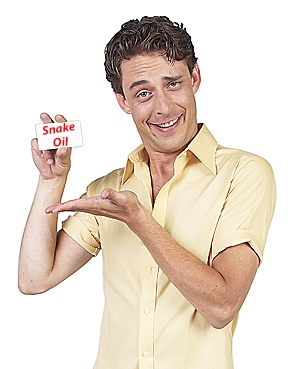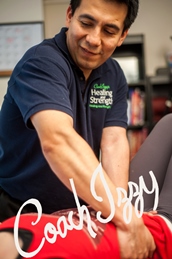The arrival of the World Wide Web has transformed the way we communicate and consume information. We have immediate access to the latest from multiple sources, all enriched with a variety of perspectives.
This is a welcome change, considering that only about two decades ago the prohibitive costs of distribution channels meant that crucial information was relegated to darkness if it couldn’t afford the limited options. Only those with deep pockets enjoyed unobstructed access to disseminate their curated information. How refreshing that nowadays anyone can easily distribute valuable content.
In the pain therapy field this means that effective modalities and breakthrough knowledge, even if not mainstream, can quickly reach those who benefit the most. Unfortunately, this also means that hucksters—who find our struggle with pain lucrative—can also easily reach us.

Further, our modern idiosyncrasies prevent us from seeing how we are being manipulated and how we’re skewing healing expectations.
The Hucksters Are Not Alone
Hucksters care for only one thing: the sale. They’ll bombard us with ads, disguise as legitimate sources, and feign sincerity to accomplish this. They masterfully infect mainstream knowledge with their quackery, thus making their claims appear legitimate. They target our vulnerabilities to make us believe that the solution is only one credit card transaction away. Ultimately, all that’s left after the sale is a trail of broken promises.
How could anyone fall for it? we think, believing that our superior knowledge makes us immune to such trickery. But, are we? Or is our overconfidence blinding us to how we’re being manipulated?
Impossible! My Knowledgeable Protects Me
Technology may have given us the ability to acquire information at unprecedented rates but it doesn’t mean we’re getting more knowledgeable. Regurgitating platitudes and clichés without solving problems means we’re only storing information, not knowledge.
This has a severe effect on the pain therapy world as our illusion of knowledge makes us forget that healing is not instantaneous, so we get seduced by huckster lingo: cheats, hacks, and other nonsense. We forget that actual knowledge solves problems because it comes from trial, error, assimilation, and experience—not from a Google search. Ultimately, the illusion of knowledge makes us forget that our bodies respond to their physiologies, no to our whims.

True knowledge protects us because it’s powerful but humble. It gives us an advantage but also makes us recognize our fallibility. This protection is not evident when we’re healthy and can easily spot quackery, but the game changes when pain—especially unfamiliar pain—make us vulnerable. If our knowledge is just an illusion, not only do we fail to recognize our limitations, but we also become ripe targets for quackery, concoct quackery of our own to save face, and perpetuate what we once denounced.
The Struggle of Accountability and Intuition
There is an aspect I believe skews our healing expectations the most: our lack of accountability. We seem to have forgotten that the responsibility for our healing is largely in our hands, and that nothing or nobody can do the healing for us.
We cannot be fully blamed for this attitude, though.
For starters, we prefer to be told what to do because we’ve been conditioned to not question those we deem as authorities. To do otherwise is reckless since we, mere citizens, don’t know better. Thus, our thinking goes dormant. In addition, we have a hard time choosing a path because we’ve been conditioned to disregard intuition and worship linear thinking. To heed our intuition is considered capricious esotery more likely to harm us than helps us.

Being accountable is difficult not because we don’t want to be accountable, but because we don’t know how to be accountable.
But accountability—simple in concept but difficult in execution—is a must for long-term healing as it seeks true knowledge rather than hacks, turns experience into valuable references, and protects us from the bombardment of manipulated information competing for our funds. Accountability requires that we seek our own answers and honor our intuition, that we start thinking differently and start embracing the abstract of our neglected inner wisdom.
Are my Healing Expectations Unrealistic?
The answer depends on a multitude of personal factors but the influence of hucksters, misinformation, and lack of accountability has created extremes that may conflict with reality. For instance:
Length of Sessions – Some think that fifteen minutes should be more than sufficient to relieve years of pain; others think they need non-stop treatment for five hours.
Number of Sessions – Some believe that a therapeutic modality is useless if they’re not cured in one or two sessions. Others believe that they’ll need treatment for the rest of their lives.
Frequency of Sessions – Some think one session a year is plenty, some think they should get treatment every day.
Healing Rates – Some believe we all heal at the same rate, some believe the rules of physiology don’t apply to them.
Ignoring Intangible Factors – The misguided reliance on linear relationships makes many believe that every pain has a purely physical source, such as the ambiguous pinched nerve. In doing so, they ignore powerful healing-delaying factors such as allergies, stress, or lack of sleep.
Ignoring Tangible but not-mainstream Factors – There are measurable and visible factors that, although not widely popular, interfere with healing. Refusing to acknowledge how leg length inequalities, scar tissue, surgeries, or history of previous traumas slow down our healing won’t nullify their effects.
Final Thoughts
Healing never was, still isn’t, and it will never be linear because it’s an individual journey, and as such, as variable as the individual. In the end, the efficiency of our healing is up to us.
By honoring true knowledge and our intuition we stop believing misinformation and start creating our ideal healing environment. We’ll never heal faster than nature intended but that doesn’t mean we can’t optimize our healing and ensure the results are long lasting.
Until next time, may you enjoy a fit and pain-free life!
